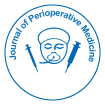
Journal of Perioperative Medicine
Open Access
ISSN: 2684-1290

ISSN: 2684-1290
Short Communication - (2023)Volume 6, Issue 3
Perioperative medicine is a multidisciplinary field of medicine that focuses on the care of patients before, during, and after surgery. It involves a team of healthcare professionals, including surgeons, anesthesiologists, internists, and other specialists, working together to optimize patient care and enhance surgical outcomes. The primary goal of perioperative medicine is to reduce the risk of complications and improve patients' quality of life after surgery.
Preoperative assessment and optimization
The preoperative phase is crucial for optimizing patients' health before surgery. A thorough preoperative evaluation allows healthcare professionals to identify and manage medical conditions that may increase the risk of complications during or after surgery. This evaluation includes a comprehensive medical history, physical examination, laboratory tests, and imaging studies. The preoperative assessment also involves a risk assessment that considers the patient's medical history, age, comorbidities, and the type of surgery planned [1].
Once the preoperative assessment is complete, the healthcare team can develop a plan for optimizing the patient's health before surgery. This plan may involve medication adjustments, smoking cessation, weight loss, and physical therapy [2]. The team may also recommend additional interventions, such as nutritional support, to improve the patient's overall health and reduce the risk of complications.
Anesthesia management
Anesthesia management is a critical component of perioperative medicine. Anesthesiologists are responsible for providing safe and effective anesthesia during surgery while monitoring the patient's vital signs and managing any complications that may arise. The goal of anesthesia management is to ensure that the patient is comfortable and pain-free during surgery while minimizing the risk of adverse events [3-5].
Modern anesthesia techniques, such as regional anesthesia, have greatly improved patient outcomes by reducing the need for general anesthesia and minimizing the risk of complications. Regional anesthesia involves injecting a local anesthetic near the nerves that provide sensation to the surgical area, resulting in reduced pain and faster recovery times. Anesthesiologists may also use advanced monitoring techniques, such as Bispectral Index (BIS) monitoring, to assess the patient's level of consciousness during surgery and adjust the anesthesia accordingly [6-8].
Postoperative care
Postoperative care is an essential component of perioperative medicine. The goal of postoperative care is to manage pain, prevent complications, and promote healing. Postoperative care begins immediately after surgery and may continue for several weeks, depending on the type of surgery performed.
One of the most critical aspects of postoperative care is pain management. Effective pain management is essential for promoting recovery and preventing complications such as deep vein thrombosis, pneumonia, and other infections. Healthcare professionals may use a combination of medications, including opioids, Non-Steroidal Anti-Inflammatory Drugs (NSAIDs), and local anesthetics, to manage pain after surgery.
Postoperative care also involves monitoring for complications such as bleeding, infection, and respiratory failure. Early detection and treatment of complications are essential for preventing long-term morbidity and mortality [9].
Patient education
Patient education is an important component of perioperative medicine. Educating patients about the surgical process, potential complications, and postoperative care can help reduce anxiety and improve outcomes. Healthcare professionals may provide patients with written materials, educational videos, and one-on-one counseling sessions to ensure that they understand what to expect before, during, and after surgery.
Patients may also receive guidance on nutrition, physical therapy, and other aspects of postoperative care that can help improve their recovery. Encouraging patients to participate in their own care can also help improve outcomes by promoting adherence to postoperative care plans and reducing the risk of complications [10].
Perioperative medicine plays a critical role in enhancing surgical outcomes. By focusing on preoperative assessment and optimization, anesthesia management, postoperative care, and patient education, healthcare professionals can help reduce the risk of complications and improve patient’s quality.
[Crossref] [Google Scholar] [PubMed]
[Crossref] [Google Scholar] [PubMed]
[Crossref] [Google Scholar] [PubMed]
[Crossref] [Google Scholar] [PubMed]
[Crossref] [Google Scholar] [PubMed]
[Crossref] [Google Scholar] [PubMed]
[Crossref] [Google Scholar] [PubMed]
[Crossref] [Google Scholar] [PubMed]
[Crossref] [Google Scholar] [PubMed]
[Crossref] [Google Scholar] [PubMed]
Citation: Tong G (2023) Perioperative Medicine: Enhancing Surgical Outcomes. J Perioper Med. 6:163.
Received: 01-May-2023, Manuscript No. JPME-23-24127; Editor assigned: 03-May-2023, Pre QC No. JPME-23-24127 (PQ); Reviewed: 17-May-2023, QC No. JPME-23-24127; Revised: 24-May-2023, Manuscript No. JPME-23-24127 (R); Published: 31-May-2023 , DOI: 10.35248/2684-1290.23.6.163
Copyright: © 2023 Tong G. This is an open-access article distributed under the terms of the Creative Commons Attribution License, which permits unrestricted use, distribution, and reproduction in any medium, provided the original author and source are credited.